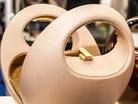From 3D printer to international catwalk

The National Manufacturing Institute Scotland (NMIS) is using 3D printing technology to create sustainable fashion.
In a research and development project led by NMIS (which is operated by the University of Strathclyde), a reinvented ROCIO handbag will debut at Paris Fashion Week.
The National Manufacturing Institute Scotland (NMIS) is using 3D printing technology to create sustainable fashion.
In a research and development project led by NMIS (which is operated by the University of Strathclyde), a reinvented ROCIO handbag will debut at Paris Fashion Week.
3D printing in fashion manufacturing
Luxury eco-fashion brand ROCIO was founded in Scotland. The company is best known for its handbags, which are sculpted from acacia wood.
The brand is using new, sustainable manufacturing methods with the technological capabilities at NMIS, with its own skills to create the inner structure of the bag, that could be used as the basis for luxury fabric coverings.
The collaboration between NMIS and ROCIO started out as a desire to discover the capabilities of additive manufacturing, which is often considered more sustainable than traditional manufacturing techniques.
3D printing is a form of additive manufacturing, where one layer at a time is printed, making space for customisation. The technique then allows the manufacturing of complex structures which would be very difficult to manufacture in any other way.
3D print reduces waste, saves time and lowers production costs.
Innovative manufacturing technology, sustainable fashion
Utilising new technologies in the manufacturing process revolutionises the design process, allowing ROCIO to explore different materials and design constructs.
Atelier, a fashion business school in Spain, then used this prototype to create a final fully structured leather handbag – a first for ROCIO compared to its wooden product.
"A core aim of NMIS is to engage with and support SMEs to facilitate a positive impact on the local economy and the wider industry”, said Andrew Brawley, NMIS Research & Design Engineer. “We have a team dedicated to helping SMEs in their route to innovation and exploitation of new goods and services in response to industry needs – and this ROCIO project is a prime example. We hope this will be the beginning of a long-trusted relationship with the team at ROCIO as this new exploration showcases the endless possibilities available.”
"We are really taken aback by the results. We're at the heart of sustainable fashion and take pride in each accessory being a uniquely creative masterpiece”, said Hamish Menzies, ROCIO Creative Director. “The pieces produced are works of art and this unique leather handbag concept delivers outstanding beauty in a structured art form which I believe pushes the boundaries of design.
"For us, exploring the use of a 3D printed prototype is more cost, time and material efficient in the long term. Through using this technology, we are one step closer to improving our endeavours to be even more sustainable, whilst unlocking and embracing the future capabilities of our industry."
- The University Manufacturing Circuit Boards from LeavesSustainability & ESG
- Schneider Electric's Commitment to Sustainable ManufacturingSustainability & ESG
- Lenovo & Saudi Alat Building Green Manufacturing FacilitySustainability & ESG
- Nissan Brings Biodiversity to the Factory through RewildingSustainability & ESG

